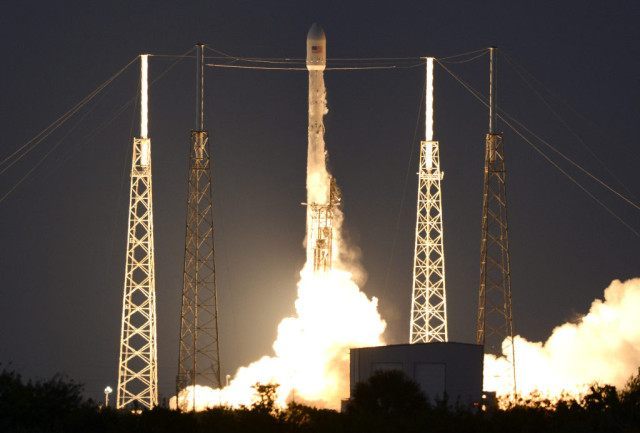By cutting future commercial space flight costs by a third with their successful landing of a spent first-stage vehicle on a barge in the Atlantic, SpaceX just ignited an economic space boom that will be the defining feature of the 21st Century.
Stratfor Global Intelligence argues that for nations to “pursue both military and economic objectives” they expect in the coming decades, access to and control of space will be an increasingly important aspect of national affairs, even as the skies become increasingly competitive.
The cost for a Russian Proton or a SpaceX Falcon 9 first-stage-boaster-rocket launch is about $60 million. The reliability of both of the vehicles has averaged about 19 out of 20 missions, or 95 percent.
But mission failures also lose even more expensive payloads, such as the May Russian launched from Kazakhstan carrying a $300 million Mexican communications satellite that disintegrated over Siberia and the June SpaceX launch from Florida with $110 million in NASA supplies for the International Space Station that exploded two minutes into its flight.
A huge additional cost is the time lost from a failed space launch, such as the 9 months it took to prepare and launch the latest SpaceX flight resupply mission that is scheduled to dock with the Space Station on April 10 to transfer 7,000 pounds of supplies and hardware.
A key delivery on board the latest launch includes the Bigelow Expandable Activity Module (BEAM), which will be attached to the space station to test a 565 foot microgravity space habitat pod as a bolt on addition to the Space Station living area.
“There is a lot of money out there seeking return,” said Chris Kunstadter, senior vice president and global underwriting manager for space at XL Catlin insurance brokers. “You don’t have many losses, but when you do, they’re large.” He estimates the insurance industry booked $750 million in premiums last year, but lost money on the business.
SpaceX is seeking to disruptively launch a space boom by creating the first reliable and reusable fist-stage rocket. SpaceX President Gwynne Shotwell estimated last month that the cost of relaunching a used rocket, net of $1 million in refueling and $3 million in refurbishment, would be $40 million, over a 30 percent savings versus the current cost.
The April 8 breakthrough by SpaceX comes just as, “New powers take to space as costs go down and the military and economic importance of space grows,” according to Stratfor. The traditional space powers that include the U.S., Russia and Europe are soon expected to be joined by serious independent efforts from China, Japan, South Korea, North Korea and India. Stratfor also expects that Turkey, Brazil, Argentina and others will eventually initiate their own space programs.
The national defense side of the U.S. effort is moving to militarize space against rising threats from competitors’ capability to use anti-satellite and directed energy weapons to damage or blind critical components of what has been America’s omnipotent umbrella of reconnaissance and command satellites.
But the U.S. also supports sharing space commercialization as an international public good through its sponsorship private American-based aerospace launch firms, such as SpaceX, Amazon Blue Origin, and Virgin Galactic. These private sector entities are tasked with driving down the access costs to make it easier for all nations to get involved in commercial space exploitation activities.
The United States strategy for space recognizes that the proliferation of rocket technology by government entities and private companies will make it effectively impossible to restrict access to space. That is why, “Washington must pin its strategic interest on maintaining its current advantage as the world’s industrial and innovation powerhouse to remain one step ahead of competitors emerging across the globe, according to Stratfor.

COMMENTS
Please let us know if you're having issues with commenting.